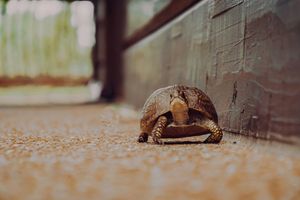
Most, if not all, reptiles carry Salmonella bacteria in their intestinal tract and intermittently or continuously shed these bacteria in their feces. Salmonella bacteria usually do not cause any illness in reptiles but can cause serious illness in people.
Salmonella bacteria are easily spread from reptiles to humans. Humans may become infected when they place their hands on objects, including food items, that have been in contact with the stool of reptiles, in their mouths. For example, infants have become infected after drinking from bottles of infant formula that became contaminated during preparation. Individuals who
prepared the formula had not washed their hands after touching a reptile or because reptiles were allowed to walk on kitchen counters. For Salmonella bacteria to spread from reptiles to humans, the bacteria must be ingested.
Therefore, simply touching or holding reptiles will not result in the spread of bacteria unless something contaminated with reptiles' feces or the reptile itself is placed in the mouth.
Most Salmonella infections in humans result in a mild, self-limiting illness characterized by diarrhea, fever, and abdominal cramps. However, the infection can spread to the bloodstream, bone marrow, or nervous system, leading to severe, and sometimes fatal, illness. Such severe infections are more likely to occur in infants and in individuals whose immune system is compromised (for instance, bone marrow transplant recipients, persons with diabetes mellitus, persons infected with the human immunodeficiency virus, and chemotherapy patients).
Unfortunately, Salmonella bacteria cannot be eliminated from the intestinal tract of reptiles. Administration of antibiotics to eliminate these bacteria has been unsuccessful and may result in the emergence of Salmonella bacteria that are resistant to antibiotics.
Attempts to raise or identify reptiles that do not carry Salmonella bacteria have also been unsuccessful; therefore, bacterial culture of stool samples in an attempt to identify reptiles that are not carrying Salmonella bacteria is not recommended.
Fortunately, the spread of Salmonella bacteria from reptiles to humans can be easily prevented by using the following routine precautions:
Information in this post is not meant to discourage reptile ownership. With a few exceptions (for example, infants or immunocompromised individuals), most people have a low risk of acquiring salmonellosis from reptiles, but this risk can be reduced even further by following simple precautions. Reptiles can be safely kept as pets, but reptile owners should be aware of the methods for reducing their risk of acquiring Salmonella bacteria from their reptiles.
This post was developed by the Association of Reptilian and Amphibian Veterinarians in collaboration with the Centers for Disease Control and Prevention and is intended for informational purposes only; please seek advice from your physician and your reptile’s veterinarian if questions or problems occur.
Source:
Copyright © All Rights Reserved
